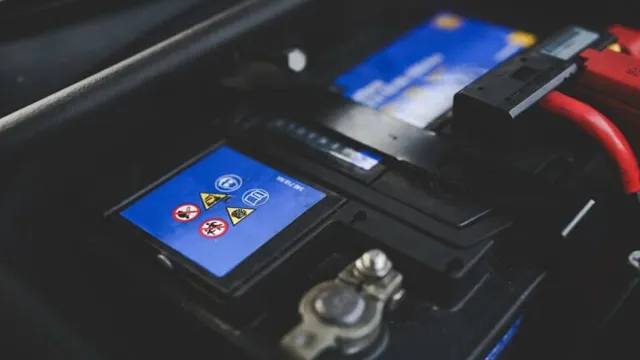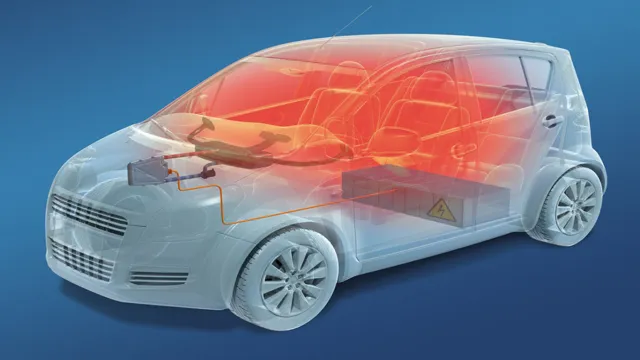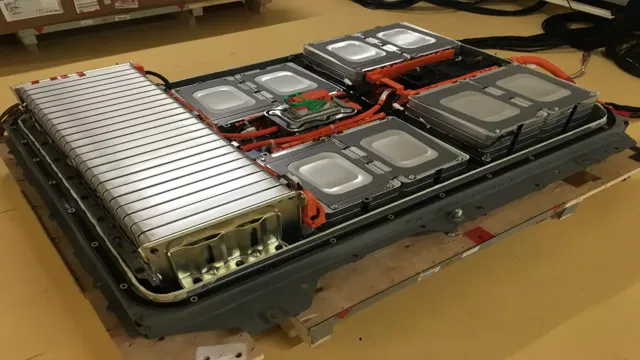Could Electric Battery Failure Trigger a Mass Exodus from the Car Industry?
The car industry is undergoing a major shift, and it all revolves around electric battery failures. As demand for electric vehicles continues to increase, so does the pressure for manufacturers to produce batteries that can perform and last for years to come. Unfortunately, not all batteries have been up to par, causing a flurry of recalls and safety concerns.
This has led some companies to leave the electric car market altogether, while others have shifted their focus to developing better battery technology. The exodus from the car industry has been a wake-up call for manufacturers, prompting them to reassess their processes and invest in research and development. So, what does this mean for consumers? On the one hand, the shift towards better battery technology is promising and could result in longer-lasting and more efficient electric cars.
However, the recalls and safety concerns have caused some consumers to lose faith in the technology and stick with traditional gas-powered vehicles. Regardless of which side of the fence you may be on, one thing is clear – electric battery failures have sent shockwaves throughout the car industry and may continue to do so until a reliable and safe solution is found.
The Problem
Electric battery failure is a huge concern for the automotive industry. This issue could potentially result in an industry exodus if manufacturers are unable to find a way to address it effectively. Battery failure poses a significant risk to both drivers and manufacturers.
In addition to safety concerns, the cost of replacing a failed battery can be prohibitively expensive, putting consumers off electric vehicles and turning them towards traditional petrol and diesel-powered models. This could lead to a significant decline in demand for electric cars, creating a catastrophic situation for the electric vehicle industry. As we move towards a greener future, it is essential that the automotive industry finds a way to overcome these challenges and deliver reliable, cost-effective electric vehicles that can compete with their traditional counterparts.
The number of electric car recalls due to battery issues in recent years
Over the last few years, there has been a significant increase in the number of electric car recalls due to battery issues. This poses a problem not only for manufacturers but also for consumers who have invested in this new technology. One of the primary concerns has been that some of these recalled cars have been linked to battery fires, which can be extremely dangerous.
Manufacturers have been working hard to identify the root cause of these battery issues and to implement safety measures to prevent further incidents from occurring. While electric cars are still a relatively new technology, it is crucial that manufacturers continue to make advancements in battery research and design to ensure the safety and reliability of these vehicles in the future. The keyword used throughout this paragraph is “electric car recalls due to battery issues.
“

The cost of replacing faulty batteries and its impact on car manufacturers
The cost of replacing faulty batteries in electric cars is a problem that concerns car manufacturers worldwide. These batteries are an integral part of the electric car system, and replacement costs can be high, sometimes even outweighing the cost of the car itself. Additionally, faulty batteries pose safety risks and can lead to brand damage, causing loss of trust among consumers.
With the increasing demand for electric cars and their rising popularity, manufacturers must find a way to mitigate this issue. This challenge presents opportunities for car companies to improve the reliability of their batteries and reduce replacement costs. However, these costs can also slow the adoption of electric cars and hinder the efforts to combat climate change.
As car companies strive to create a better, more sustainable future, tackling battery replacement costs will be a crucial factor in the success of the electric car market.
The potential safety hazards and consumer distrust as a result of battery failures
The problem with battery failures in electronic devices goes beyond inconvenience and frustration. Such failures can pose major safety hazards and erode consumers’ trust in the device and brand. Lithium-ion batteries are known to be prone to heat build-up and overcharge, which can cause them to burst or catch fire.
This is a scary prospect for users, especially when such incidents happen unexpectedly. In addition to the risks, battery failures also lead to financial losses for consumers and potential liabilities for manufacturers. Furthermore, when news of such incidents spreads, it can create negative publicity and damage the brand’s reputation, leading to a decrease in sales and market share.
Addressing battery failures through quality control and robust safety measures is crucial not just for the users’ well-being but also for the success of the device and brand.
The Implications
Electric battery failure may lead to a catastrophic outcome for the automobile industry. The world’s shift towards electric vehicles to combat climate change has spawned a rising demand for electric car production. However, with this surge in production, there is an increased need for lithium-ion batteries, whose production has a significant environmental footprint.
In addition, the sheer volume of electric cars being manufactured increases the chances of defect in the batteries. Any failure in electric batteries could call for an immediate and complete recall of the cars, resulting in lost revenue for the companies. Not to mention the fact that customers might lose faith in these cars and switch back to the conventional ones.
The flashbacks of the Samsung Galaxy Note 7 or Toyota’s infamous gas pedals tell us the same story. Electric batteries are the cornerstone of EVs, and a failure in them could cause an industry exodus. Consequently, the industry must take stringent measures to ensure battery quality control, and the sudden increase in demand for electric vehicles should be a cause for concern, warranting the development of more resilient and sustainable battery alternatives.
The possibility of car manufacturers shifting their focus away from electric technologies
With the increasing focus on the development and adoption of electric vehicles in recent years, it’s surprising to think that car manufacturers could potentially shift their focus away from electric technologies. However, this possibility has implications that could impact the future of the automotive industry. If car manufacturers were to shift their focus away from electric technologies, it could slow down the progress made towards transitioning to sustainable transportation.
It could also result in a lack of innovation and competition in the market, which could ultimately harm consumers. Furthermore, it may lead to a missed opportunity for car manufacturers to establish themselves as leaders in the transition towards sustainable transportation. While it may seem counterintuitive for car manufacturers to shift their focus away from electric technologies, it’s important to consider the implications of such a move.
Ultimately, it may not be wise for them to do so, given the increasing demand and necessity for sustainable transportation.
The impact on government policies and support for electric vehicles
As electric vehicles (EVs) continue to become increasingly popular, it is foreseeable that government policies and support for EVs will also increase, leading to more incentives for their purchase and use. This support may come in the form of tax credits, rebates, grants, and subsidies, which can significantly reduce the cost of buying and owning an EV. Furthermore, governments may invest in EV charging infrastructure and develop regulations that facilitate the transition to EVs.
For instance, governments may create low-emission zones or mandate the adoption of EVs in public transportation systems. Policies that encourage the use of renewable energy sources can also play a crucial role in promoting the adoption of EVs, as they go hand in hand in reducing greenhouse gas emissions and mitigating climate change. Overall, government support for EVs can result in lower costs for drivers, reduced emissions, and improved air quality, making EVs a more attractive option for consumers.
The opportunities for alternative energy storage solutions
The rapidly growing demand for energy around the world has led to an increased focus on finding alternative energy storage solutions. The implications of this shift towards renewable energy sources are numerous, ranging from reduced carbon emissions to increased energy independence. One of the primary advantages of alternative energy storage solutions is that they allow for more efficient use of renewable energy sources, such as wind and solar power.
In addition, alternative energy storage solutions provide a more reliable and resilient energy infrastructure, which is critical in the face of natural disasters and other disruptions. As the technology for alternative energy storage solutions continues to develop and improve, we can expect to see a significant shift in how we produce and consume energy around the world. By embracing these opportunities, we can create a more sustainable future for ourselves and future generations to come.
So, let’s focus on harnessing the power of alternative energy storage solutions and move towards a cleaner, greener, and brighter future.
The Solutions
Electric battery failure could have a disastrous effect on the car industry, and companies need to invest heavily in finding a solution to this problem before it’s too late. With the push towards electric vehicles, the need for reliable and long-lasting batteries has never been more critical. If companies fail to address these issues, consumers may lose faith in electric cars, ultimately leading to a decline in sales and even an exodus from the industry.
However, there are solutions to this problem such as improving battery management, investing in research and development of better batteries, and the implementation of rapid charging technology. Companies also need to consider the environmental impact of the disposal of batteries and find better ways to recycle and reuse them. By taking these measures, we can ensure that a failure in electric battery technology does not lead to the downfall of the car industry but rather its continued growth and success.
The need for improved battery design and manufacturing processes
Improving battery design and manufacturing processes is crucial to meeting the growing demand for efficient and long-lasting batteries. One solution is to use advanced materials like graphene, which can improve battery performance and reduce manufacturing costs. Another approach is to optimize the production process to minimize defects and ensure uniformity in the battery cells.
This can be achieved through automation and Quality Control checks at every stage of manufacturing. Additionally, the use of machine learning algorithms can help analyze data from battery performance tests to identify areas for improvement in design and manufacturing. Together, these solutions can streamline the battery production process and lead to the development of better, more reliable, and sustainable battery technologies.
The importance of regulatory oversight and consumer education
One of the key solutions to addressing the importance of regulatory oversight and consumer education is to increase transparency and accountability in the financial sector. This can be achieved through stricter regulations and rules around financial products, services and institutions, as well as greater transparency in financial reporting and disclosure. At the same time, consumers must also be educated on the importance of being financially responsible, including understanding their rights and responsibilities, managing their debts, and making smart investment decisions.
This can be achieved through financial literacy programs, consumer education initiatives and other outreach efforts aimed at empowering consumers to make informed financial decisions. By working together, regulators, financial institutions and consumers can help ensure a more transparent, safe and secure financial system that benefits everyone.
Conclusion: The Future of Electric Cars
In the fast-paced world of technology and innovation, electric batteries have become the driving force of the automotive industry. But with the recent reports of battery failures, car manufacturers are faced with a daunting question: will they stay and fix the problem, or flee to other alternatives? As electric cars continue to gain popularity, the pressure is mounting for the industry to find a solution. Only time will tell if they will rise to the challenge, or suffer the consequences of a mass exodus.
“
FAQs
What is the primary reason behind the possibility of a car industry exodus due to electric battery failure?
According to reports, electric battery failure is being seen as a potential reason for a car industry exodus as it could lead to a decrease in production and sales.
How might the car industry be impacted if electric battery failure becomes more common?
If electric battery failure becomes more common, the car industry may see a decline in sales, production, and overall profitability, leading to potential job cuts and plant closures.
Are there any measures being taken by the car industry to address concerns around electric battery failure?
Yes, car companies are investing in research and development to improve the reliability and safety of electric batteries, and are also exploring alternative means of powering vehicles.
What can consumers do to mitigate the risk of electric battery failure in their vehicles?
Consumers should follow all recommended maintenance protocols for their electric vehicles, including regular battery checks and replacements, and pay attention to any warning signals indicating potential battery failure.





